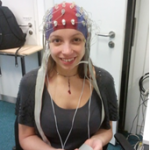
When should you listen to music to boost task performance?
Hello Dear Reader,
 This week I have been picking strawberries and I have returned to writing a new book. I signed a contract during the last month of my pregnancy and then – as you may predict – not much happened.
This week I have been picking strawberries and I have returned to writing a new book. I signed a contract during the last month of my pregnancy and then – as you may predict – not much happened.
My new book will involve research with music providers and recipients so I have spent time up to now organising this work, including getting my ethics in line with new GDPR regulations. Finally it’s time to get writing!
 Like many, I can struggle with writing. I find it tricky to keep up with Stephen King’s guidance that a writer should aim for 1000 words a day. Some days I am thrilled with 50 words, as long as I am making progress. I do however, agree with the fright master’s comment (20 top tips for writers) that I get a lot more done when I cut TV time! Does music help us to write?
Like many, I can struggle with writing. I find it tricky to keep up with Stephen King’s guidance that a writer should aim for 1000 words a day. Some days I am thrilled with 50 words, as long as I am making progress. I do however, agree with the fright master’s comment (20 top tips for writers) that I get a lot more done when I cut TV time! Does music help us to write?
I am often asked to comment on whether music helps cognitive task performance (let’s leave exercise and other physical activities aside for this post). Is music your friend or a foe, like TV, if you are studying, writing, problem solving, or engaging in creative idea generation?
Around the time of my pregnancy I filmed a short advice vlog for the BBC on the relationship between personality, music and cognitive task performance. The video mentions a well known theory relating the personality trait extraversion to music listening, a theory that is attributed to the renowned cognitive psychologist Hans Eysenck.
The Eysenck personality theory states that people vary on an extraversion continuum as a result of different base levels of internal cortical arousal. Those with high levels are inclined to introversion, whereas those with low levels exhibit traits of extraversion.
 The impact of music on task performance differs according to your place on the extraversion continuum. Since music can raise arousal levels, extraverts are more likely to benefit from music as it can help them to an optimum arousal state where performance is best.
The impact of music on task performance differs according to your place on the extraversion continuum. Since music can raise arousal levels, extraverts are more likely to benefit from music as it can help them to an optimum arousal state where performance is best.
Introverts in the same conditions are more likely to be over-stimulated and their task performance will suffer. The relationship is depicted as the Hebbian Yerkes Dodson (HYD) curve, which you can see above. In fact, most studies in this area tend to show a detrimental impact on introverts performance rather than any substantial boost to extraverts.
Despite the somewhat one sided nature of the evidence, I have described this theory many times, including as part of my first book. Now a new paper presents an interesting theory that refreshes the arguments of the HYD curve and adds a new dimension to the question of how music impacts on task performance.
Dr. Mats Küssner has published his free access paper in Frontiers, where he provides a good review of studies in this area. He has shown that – actually – there are many papers that fail to find evidence for the HYD curve relationship between personality, music and task performance. This lead him to question why.
The first argument for the mix of results is that extraversion/ introversion can be more reliably measured by looking at brain waves than giving out questionnaires. This was often suggested by Eysenck himself. So perhaps we should take questionnaire studies with more of a pinch of salt.

Traditionally, cortical arousal is measured as alpha power using EEG. Extraverts have higher baseline alpha power (i.e., less cortical arousal) than introverts. Introverts conversely show less activity in alpha band (i.e., more cortical arousal) during presentation of positive, negative or neutral non-verbal auditory stimuli.However, there are issues with alpha power studies. A full review of the research, as provided by Mats, reveals a mixed bag of findings rather than solid support.
Another option is to look in the beta band, the traditional brain wave of alertness. As far back as 1969 people were reporting that extraverts showed more beta power whilst their eyes were shut compared to introverts. Findings with this measure are more consistent than those in the alpha band camp, but they are still lacking in many ways. Despite the murky waters, Mats puts forward the argument that the beta band is the way to go in future.
The interesting question he then poses is, if beta power can be shown as a reliable indicator of cortical arousal, can we manipulate it with music to enhance task performance?
 The key here is to introduce music BEFORE the task, rather than play it during the task, as is typically done in background music tasks, and is more often done in real life.
The key here is to introduce music BEFORE the task, rather than play it during the task, as is typically done in background music tasks, and is more often done in real life.
A burst of focused music listening BEFORE a task should boost cortical arousal, which would ideally be shown a peak in beta power. Evidence for this relationship already exists (Nakamura et al., 1999)
The ‘music-before, beta measure’ paradigm would provide a way to establish a person’s baseline arousal level and then -if it exists – show an effect of music. Then both effects could be linked to eventual task performance across different individuals according to their personality type.
This is all just theory of course, but I am taken with the idea that focused listening to music BEFORE a task is a cleaner and simpler way to run this kind of experiment. It means exposure to music can be better regulated and task distraction effects of music listening are removed. And in the meantime, whilst this research is carried out, I will be testing out the logic of this advice by doing some focused music listening before my book writing this week. Let’s see if it helps!


